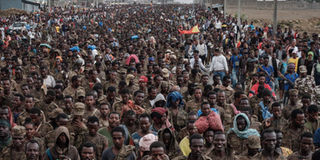Prime
Tigray rebels accept 'ceasefire in principle' but set conditions

Captive Ethiopian soldiers walk towards the Mekele Rehabilitation Center in Mekele, the capital of Tigray region, Ethiopia, on July 2, 2021. According to the Tigray Defence Forces (TDF), more than 7,000 captive Ethiopian soldiers have walked from Abdi Eshir, about 75 km southwest of Mekele, for four days. PHOTO/AFP
What you need to know:
- Tigray has been the scene of fighting since Prime Minister Abiy Ahmed sent the army in early November to topple the dissident regional authorities, which emerged from the Tigray People's Liberation Front (TPLF).
Rebels in Ethiopia's war-torn Tigray region on Sunday accepted "a ceasefire in principle" but posed strict conditions for it to be formalised.
Notable among those conditions was the withdrawal from the region of Eritrean forces as well as fighters from the neighbouring Ethiopian region of Amhara, who have been supporting the Ethiopian army during the eight-month long conflict.
Tigray has been the scene of fighting since Prime Minister Abiy Ahmed sent the army in early November to topple the dissident regional authorities, which emerged from the Tigray People's Liberation Front (TPLF).
The 2019 Nobel Peace Prize winner accused them of orchestrating attacks on Ethiopian military bases.
After early successes and a premature declaration of victory, government forces were bogged down in a vicious and months-long battle with pro-TPLF fighters -- the Tigray Defence Forces, or TDF. The Ethiopian army was backed by troops from the neighbouring Amhara region and the army of Eritrea, which borders Tigray.
On Monday, the TDF recaptured Mekele, held by the Ethiopian army since 28 November.
The government in Addis Ababa immediately declared a unilateral ceasefire, but this was swiftly derided as a "joke" by the rebel forces, which vowed to continue fighting.
Now the rebels have agreed to a ceasefire in principle but another of their conditions is the restoration of what Addis Ababa considers the rebel government in Tigray.
The United Nations and numerous government have called for a ceasefire to be respected, especially to allow humanitarian aid to reach civilian populations.
"As long as we have a foolproof guarantee that the security of our people will not be compromised by a second round of invasions, we accept a ceasefire in principle," a statement signed by the "government of Tigray" said on Sunday.
'Thorny issues'
"However, before a ceasefire agreement is formalised, the following thorny issues must be resolved," the text continues, before listing the conditions.
The rebel authorities are also calling for "procedures to hold Ethiopian Prime Minister Abiy Ahmed and President Issaias Aferworki to account for "the damage they have caused", as well as the creation by the UN of an independent investigation body to probe the 'horrific crimes' carried out during the conflict.
Other conditions are humanitarian, including the distribution of aid and the safe return to Tigray of displaced people.
The government in Addis Ababa has always refused to open any dialogue with the TPLF leaders, classifying the group as a terrorist organisation by parliamentary decree.
According to the UN, over 400,000 people have "crossed the threshold into famine" in Tigray and 1.8 million people are on the brink of famine.




